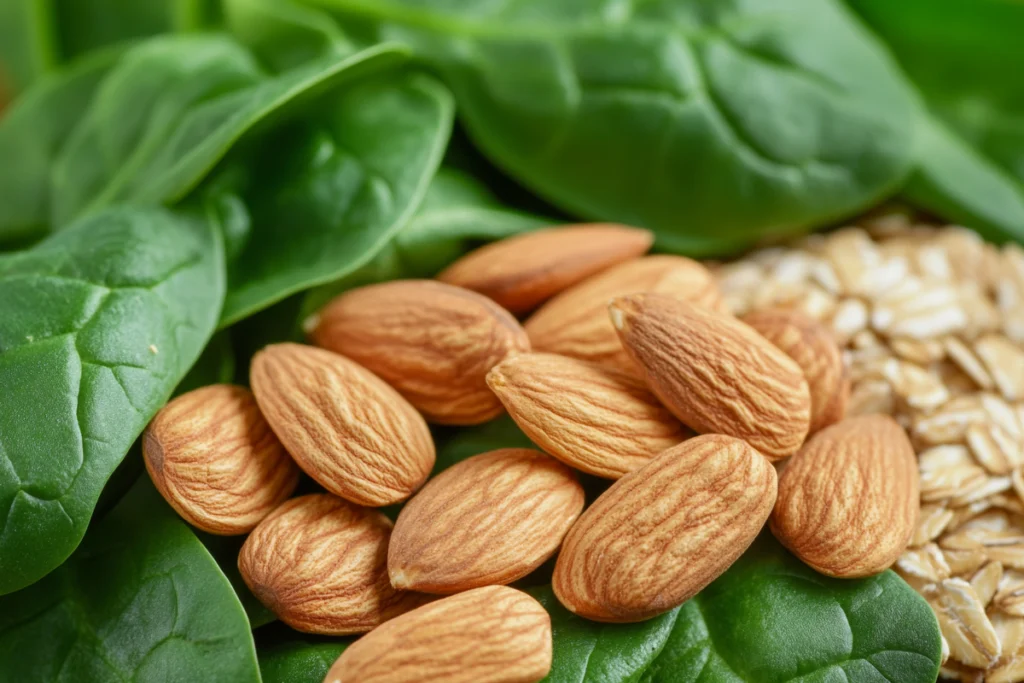
Height plays a big part in how we view ourselves, right? Whether for confidence or simply because we want to feel our best, growing taller can be a goal for many. So, when it comes to growing taller, there’s a common misconception: it’s all about genetics. But, honestly, nutrition for growing taller plays a huge role. What you eat can significantly impact your height growth, especially if you’re still growing. But even if you’re an adult, proper nutrition can help maximize your potential. Let’s break it down and see how.
Importance of Nutrition for Height Growth
When you think about height, your first thought is probably genetics—thanks to my parents. However, nutrition is equally crucial. Your body needs a variety of nutrients to grow strong, healthy bones, tissues, and muscles. And, no, we’re not just talking about eating your veggies (though, seriously, don’t skip those).
From birth to adolescence, food provides essential vitamins and minerals for healthy bone growth. In fact, the bones in your body grow and harden based on what you’re feeding them. When you get the right nutrients, you’re giving your body the right tools to support its natural growth. Bone growth is crucial for kids and teens; missing nutrients can stunt height growth. However, even in adulthood, having a nutrient-rich diet supports optimal bone health, improving posture and overall body function.
Who Should Focus on Nutrition for Growing Taller?
You might be thinking, “I’m not growing anymore, so does this even matter for me?” Well, here’s the deal: If you’re still in your adolescent years, focusing on height is definitely important. But even if you’re past puberty, proper nutrition can maintain bone health and posture, potentially adding a little extra boost to your height (who doesn’t want that, right?). Nutrition isn’t just for kids—it’s essential for everyone, regardless of age.
So, who really needs to pay attention to their height nutrition? Adolescents are the obvious group here. But, adults, especially those who feel their bones are feeling a little weaker or they’re slouching more than usual, should also focus on nutrition. A solid diet can help maximize the full potential of your body. This isn’t just about gaining those inches—it’s about getting the best out of the height you have.
The Role of Genetics in Height and the Role of Nutrition
Let’s be real: genetics are a huge player in determining how tall we grow. You can’t out-eat your genes, but you can support them with proper nutrition. Genetics set the blueprint, but nutrition fills in the gaps. To illustrate, if your parents are tall, you’re likely to follow suit. However, if your diet is low in essential nutrients during your growth period, it could keep you from reaching your maximum height potential.
When we talk about the role of genetics, you might feel like it’s all decided for you. But that’s not totally the case. Let’s talk about how certain vitamins and minerals work with your genetic makeup to enhance your bone growth and overall height. For example, calcium, vitamin D, and protein are all crucial players, whether you’re trying to reach your full potential during growth periods or you’re an adult maintaining strong, healthy bones.
Common Misconceptions About Nutrition and Height Growth
You know those myths that claim you can grow 10 extra inches overnight by drinking some magic potion or using a crazy diet? Yeah, those are myths. The truth is, you can’t “trick” your body into growing taller by doing just one thing. It’s all about balance. In fact, there are a lot of misconceptions around nutrition and height growth. Some people say eating only certain foods will make you taller, but there’s no one magical food. You need a well-rounded, nutrient-rich diet to really make a difference.
Now, I’m not saying you should throw out the idea of drinking milk or eating more eggs to grow taller—these foods do help, but you’ve got to look at the big picture. Bone health and growth are complicated and need a wide variety of nutrients. That’s why I’m here to help you piece together the full picture!
Key Nutrients for Growing Taller

Alright, let’s get into the good stuff—the nutrients your body needs to reach its full height potential. To maximize bone growth and support healthy joints, you’ll want to be mindful of a few critical nutrients that do wonders for height.
- Calcium is essential for bone growth and strength. Dairy products like milk, cheese, and yogurt are great sources, while alternatives like fortified plant-based milk and leafy greens work for those who are lactose intolerant or vegan.
- Vitamin D helps the body absorb calcium, so it’s vital for bone health. Sunlight is the best source, but you can also find it in fatty fish, eggs, and fortified cereals.
- Protein supports muscle and tissue growth and helps build collagen, which strengthens bones and joints. Sources include chicken, turkey, beans, lentils, and nuts.
- Zinc is key for bone growth and repair, and can be found in meats, beans, nuts, and whole grains.
- Magnesium aids in calcium absorption and bone growth. It’s found in foods like spinach, almonds, and avocados.
- Collagen supports flexible bone development. Bone broth, fish, and chicken are great sources.
- This revision is under 260 words and keeps the key details. Let me know if you’d like further changes!
Core Concepts & Key Insights on Nutrition for Growing Taller
When it comes to growing taller or maximizing your height potential, it’s not just about eating the right foods. Understanding the key concepts behind bone growth, nutrition, and how your body responds to specific nutrients is essential. So, let’s break down these core concepts to help you make sense of the science behind growing taller and how nutrition truly plays a pivotal role.
Understanding the Basics of Nutrition for Height Growth
At the heart of the matter, the primary goal is to support the growth of your bones and muscles. But, before diving into the specifics, it’s important to understand how your body grows and what it needs to succeed. Bone growth, especially during childhood and adolescence, is a continuous process. Your bones are constantly being remodeled, and the body adds new bone tissue while breaking down old tissue. This is where nutrition comes into play.
For example, as your body grows taller, the growth plates in your bones (epiphyseal plates) are essential. These growth plates are where new bone tissue is formed, and they close once you reach adulthood. The healthier your bones are during your growing years, the more likely you are to reach your full height potential. That’s why the nutrients mentioned earlier—calcium, vitamin D, protein, and collagen—are crucial. They directly affect how your bones grow and strengthen, allowing for more optimal development.
It’s also important to note that your body needs adequate amounts of energy to support growth. Carbohydrates, fats, and proteins provide the fuel your body requires for these vital processes. Without enough calories from a well-balanced diet, the growth process may slow down or even stall.
Key Challenges Related to Nutrition for Height Growth
While nutrition is essential for height growth, many individuals face challenges in getting the proper nutrients required. For example, some may struggle with a poor diet that’s low in calcium or protein. Others might have nutrient deficiencies due to dietary restrictions, such as vegans who may find it difficult to get enough vitamin B12, calcium, and protein.
Improper timing is a challenge—nutrition for height growth isn’t just about the foods, but also when you eat them. Certain nutrients work best at specific times, especially after exercise when your body is repairing. After a workout, your muscles and bones need recovery, making it the best time to consume protein and other nutrients
On the other hand, some people might overdo it with foods that they believe will help them grow taller. For instance, taking supplements in excess without proper guidance can be harmful. Too much calcium, for example, can lead to kidney stones and other health problems. Therefore, balance is key.
Impact of Nutrition on Height Growth and Bone Health

Nutrition doesn’t just impact how tall you can grow—it also affects how strong and healthy your bones remain throughout life. The early years of bone growth are incredibly important, but bone health doesn’t stop once you hit adulthood. In fact, the strength and density of your bones are key for maintaining your height over time. Good nutrition helps to keep your bones from weakening and shrinking as you age, which in turn affects your overall height.
So, what’s the long-term impact of a nutrient-rich diet? If you start focusing on nutrition early on, you set yourself up for a lifetime of bone health. Not to mention, keeping your bones strong can reduce the risk of fractures or other injuries that might affect your posture (and by extension, your height).
Bones can lose mass over time if not properly cared for, so making sure you’re getting enough nutrients—especially as you age—is vital for maintaining your current height. Additionally, nutrient deficiencies can lead to weakened bones, which are more prone to bending or shrinking. Proper nutrition helps counteract this, keeping your bones dense and healthy for years to come.
Nutrition for Growing Taller: Historical and Scientific Insights
The science of nutrition and height growth isn’t new, but it’s constantly evolving. For centuries, people have understood that certain nutrients—like calcium—are vital for strong bones. But more recently, researchers have dug deeper into the specific vitamins and minerals required for optimal height growth.
Take vitamin D as an example. Historically, people who lived in northern climates where sunlight is scarce struggled with vitamin D deficiency. This led to rickets, a condition where bones become soft and weak, stunting growth. The connection between vitamin D and height has been well documented in scientific studies. In modern times, people are encouraged to get enough vitamin D through food or sunlight exposure to promote bone health and growth.
Similarly, the discovery of collagen and its role in bone growth has gained attention in recent years. Collagen production naturally decreases with age, leading many to incorporate collagen-rich foods like bone broth or collagen supplements into their diet for joint and bone health. The science of growing taller and maintaining that height is always expanding, and we continue to uncover new insights about how nutrition affects growth.
Benefits of Understanding Nutrition for Growing Taller
There’s no denying that understanding the relationship between nutrition and height growth is beneficial. First off, having a deeper knowledge of how nutrition affects your body can lead to better eating choices. When you know which nutrients are essential, it’s easier to plan meals that support bone health and overall growth.
In addition, knowledge about height and nutrition empowers you to make informed decisions about supplementation. You may decide to add a specific nutrient like calcium or magnesium to your diet to ensure you’re hitting your nutritional goals. Ultimately, understanding how nutrients work together can help you design a diet that fosters strong bones, potentially maximizing your height potential during growth years and ensuring optimal health as you age.
Moreover, focusing on bone health through nutrition can lead to other benefits, such as better posture, stronger joints, and improved muscle function. All of these play a role in not only how tall you are but also how confident and healthy you feel overall.
Practical Applications of Nutrition for Growing Taller
Now that we have covered the foundational concepts behind growing taller and the role of nutrition, it’s time to talk about practical applications. In this section, we will discuss actionable tips for applying this knowledge to your daily life, including how to structure your meals, when to eat, and how to incorporate exercise into your growth journey. We’ll also take a look at real-world examples and what the future holds for nutrition and height growth.
Actionable Tips for Using Nutrition to Support Height Growth

To maximize your height potential through nutrition, it’s crucial to make sure that you’re consuming the right foods at the right times. It’s not just about eating healthy—it’s about strategic eating. So, here are some actionable tips for using nutrition to grow taller:
- Eat a balanced diet rich in essential nutrients: Include protein, calcium, vitamin D, and collagen in your meals to support bone growth and strength. Foods like lean meats, eggs, dairy, leafy greens, nuts, seeds, and beans are great choices. For example, scrambled eggs with spinach and fortified milk offer protein, calcium, and vitamin D for growth.
- Focus on protein: Protein is crucial for muscle and bone health, playing a key role in growth. Include lean sources like chicken, fish, tofu, and legumes to support tissue development. For a high-protein diet to support growth, check out our guide on
- Consume calcium and vitamin D together: Calcium is vital for bones, but it needs vitamin D to be absorbed effectively. Foods like salmon, fortified milk, and leafy greens provide both nutrients, while sunlight also helps with vitamin D absorption.
- Don’t forget collagen: Collagen supports bones, joints, and skin. Include collagen-rich foods like bone broth, chicken skin, and certain meats. Collagen supplements can also help boost your intake.
- Meal timing matters: After physical activity, eat protein and healthy carbs to aid muscle and bone recovery. Aim for balanced meals throughout the day to ensure consistent nutrient absorption and energy.
By following these tips, you can create a nutrition plan that supports optimal growth and height development. But of course, nutrition alone isn’t enough—physical activity and lifestyle choices also play a significant role.
Challenges Related to Nutrition for Growing Taller and Solutions
While we’ve discussed some solid strategies, it’s important to acknowledge the challenges you might face. Many people struggle to consume the right amount of nutrients consistently, especially if they’re dealing with busy schedules, picky eating habits, or food allergies. However, there are ways to overcome these challenges.
- Busy schedules: If you’re always on the go, preparing balanced meals may seem like a challenge. But there are quick and easy ways to pack in the nutrients. For example, smoothies made with yogurt, protein powder, and spinach can provide both calcium and protein in one convenient meal. Meal prepping at the beginning of the week can also help you stay on track.
- Picky eaters: For children or adults who are picky eaters, it can be tough to get enough of the necessary nutrients. In these cases, adding nutrient-dense foods into familiar meals can help. For example, adding powdered collagen to smoothies or sprinkling chia seeds on your morning oatmeal can boost your intake of important nutrients without affecting the taste.
- Food allergies: For those with allergies or dietary restrictions, like lactose intolerance or gluten sensitivity, it can be tricky to find suitable alternatives. Luckily, there are plenty of plant-based and dairy-free options available. Almond milk and fortified plant-based yogurts are great sources of calcium and vitamin D for those avoiding dairy. Likewise, gluten-free grains like quinoa and rice can provide much-needed energy and nutrients.
By finding solutions to these challenges, you can consistently nourish your body with the nutrients needed to support height growth.
Real-World Examples or Case Studies of Height Growth and Nutrition
To better understand these ideas, let’s explore some real-life examples. Take athletes, for instance—they focus on proper nutrition for growing taller and maintaining their height. Basketball players, for example, prioritize high-protein meals and calcium-rich foods to support muscle development and bone health, helping them stay strong and tall
One notable example is the case of young athletes who are still in their growth years. Many elite athletes work with nutritionists to optimize their growth potential. They understand that getting the right balance of calcium, protein, and other vital nutrients can make all the difference. For instance, some athletes consume specialized meal plans that provide 25-30 grams of protein in every meal, along with sufficient vitamins and minerals to fuel bone health.
On the other hand, it’s also worth noting that some individuals, who don’t follow a proper diet or who experience chronic nutrient deficiencies, may fail to reach their height potential. For example, children who grow up without access to nutritious foods may experience stunted growth. The good news is that with proper nutrition and lifestyle changes, you can always improve your bone health at any age.
Future Trends and Predictions for Nutrition to Promote Growing Taller
Looking ahead, the future of nutrition for growing taller is very exciting. Researchers continue to make advancements in understanding how specific nutrients affect growth. For example, scientists are exploring the role of growth hormones and whether certain foods or supplements could enhance their natural production in the body. Stem cell research also holds promise, as it may one day help regenerate or repair bone tissue, contributing to height growth.
As for the future of food, there’s a growing trend toward personalized nutrition, where technology could play a role in designing meal plans based on an individual’s genetic makeup and unique needs. This could mean that, in the future, you’ll have access to highly customized diets that specifically target the nutrients needed for growth. Personalized meal plans could make it easier for people to focus on the foods that help them grow taller and stronger.
Frequently Asked Questions About Nutrition for Growing Taller
1. Can I grow taller after the age of 18?
Although most people stop growing taller after the age of 18, it is possible to experience slight increases in height in your early twenties, especially if you continue focusing on bone health. Nutrition plays a crucial role during this period, so eating the right foods like calcium-rich dairy and protein can support bone strength, which may help maximize your height potential. Additionally, regular exercise, particularly stretching exercises and strength training, can improve posture and make you appear taller.
2. Does sleep impact my height growth?
Yes, sleep plays a significant role in supporting height growth. During deep sleep, the body releases growth hormones, which are essential for bone and tissue development. Getting enough rest (7-9 hours per night) is essential, especially during your growth years. So, while nutrition is important, don’t underestimate the power of good sleep when it comes to supporting your body’s growth and health.
3. Is there any specific age when I should focus more on height growth?
Your height growth is primarily determined by your genetic factors, and it typically peaks around the late teens to early twenties. However, focusing on height-boosting nutrition during your early years (from childhood to early adulthood) can help you reach your maximum potential. While height growth may slow down or stop as you age, maintaining a healthy lifestyle and diet can still contribute to bone strength and overall health, which is valuable at any age.
4. How much calcium should I consume for optimal height growth?
The recommended daily intake of calcium varies by age. For children and teenagers (ages 9-18), the recommended amount is around 1,300 milligrams per day. Adults, especially those over 18, need around 1,000 milligrams daily. Calcium helps maintain bone health and density, and it is vital during growth periods. Sources like milk, cheese, leafy greens, and fortified plant-based options provide ample calcium, making it easier to meet these requirements.
5. Can I take supplements to help me grow taller?
While some people consider supplements for height growth, it’s important to note that there’s no magic pill that will make you taller after your growth plates close. However, supplements like calcium, vitamin D, and collagen can help maintain strong bones and joints, which is beneficial for overall health. It’s always best to consult with a healthcare provider before taking any new supplements to ensure they’re safe and effective for your individual needs.
6. How can exercise affect my height?
Exercise can definitely affect your height in indirect ways. While it won’t necessarily increase your bone length after your growth plates have closed, regular physical activity, particularly stretching exercises and strength training, can improve posture, flexibility, and bone health. Activities like swimming, yoga, and hanging exercises can lengthen the spine, which might help you appear taller. Additionally, exercise helps stimulate the release of growth hormones, which is important during your growth years.
7. Can stretching really make you taller?
Stretching doesn’t directly increase your bone length, but it can improve your posture and flexibility, making you appear taller. Regular stretching exercises like those practiced in yoga can elongate the spine, reduce slouching, and help maintain good alignment, all of which can enhance your height appearance. Plus, stretching regularly helps reduce muscle tension, supporting overall well-being, which can positively influence your growth journey.
Achieving optimal growth requires a well-balanced diet rich in essential nutrients such as calcium, vitamin D, and protein. By incorporating nutrient-dense foods into your meals, staying active, and ensuring adequate sleep, you can support your body’s natural growth potential. For additional insights on the best dietary practices, refer to the USDA Dietary Guidelines. Remember, consistency is key prioritizing your nutrition today will contribute to long-term health and development.

2 thoughts on “Nutrition for Growing Taller: Key Factors for Maximizing Height Potential”